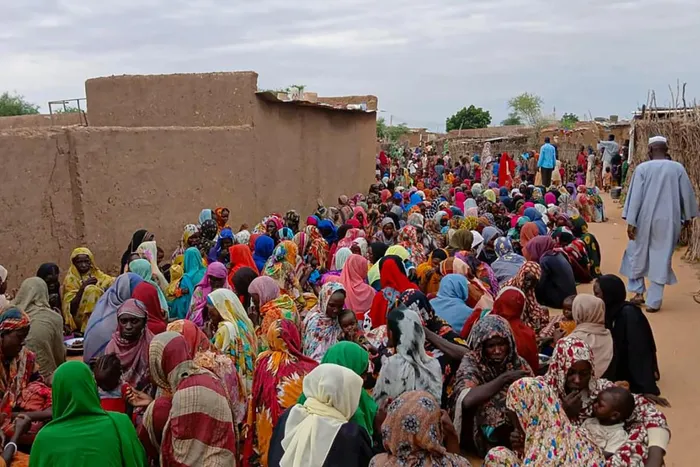
Sudanese residents gather to receive free meals in Al Fasher, a city besieged by Sudan's paramilitary Rapid Support Forces (RSF) for more than a year, in Darfur region, on August 11, 2025. RSF attacked a famine-hit refugee camp in North Darfur state on August 11, 2025, killing at least 40 civilians and injuring 19 others, rescuers said. Al-Fasher is the last city in the western Darfur region still held by the Sudanese army, at war with the paramilitary group since April 2023.
Image: AFP
Indiscriminate aerial bombardment in Sudan continues to obstruct the work of relief teams, at times escalating into direct attacks on humanitarian convoys, undermining efforts to alleviate what the United Nations has described as “the world’s worst humanitarian crisis.”
On Thursday, August 21, the Sudanese National Human Rights Observatory announced that drones operated by the Sudanese army targeted a humanitarian convoy belonging to the World Food Programme (WFP), causing material damage to trucks laden with food supplies.
The convoy, en route to deliver aid to civilians affected by the conflict, came under aerial attack amid unconfirmed reports of injuries among relief workers. The strike occurred just one day after the commemoration of World Humanitarian Day. The Observatory underscored the “painful paradox between international slogans and the reality on the ground.”
Calling for the protection of humanitarian work as “a fundamental choice and an international and moral obligation binding on all,” the Observatory warned that repeated targeting of civilians and aid convoys “undermines the foundations of international humanitarian law and threatens prospects for peace and stability.” It also published footage of food trucks engulfed in thick smoke from the attack.
The World Food Programme, in a statement released Thursday, stressed the urgency of unhindered humanitarian access: “Sudan has shifted from being Africa’s breadbasket to the world’s largest hunger crisis. More than 300,000 people remain cut off, with families starving. WFP has enough food for thousands, but we urgently need safe and unimpeded access.”
Despite UN appeals to halt airstrikes on aid convoys, the Sudanese army continues to expand its drone arsenal. The Sudanese newspaper Al-Taghyeer revealed a massive $1.5 billion defense deal between the Port Sudan authorities and Islamabad.
The report stated that the Sudanese army dispatched an official delegation to Pakistan led by Air Force Commander Lt. Gen. Pilot Taher Mohamed Al-Awad Al-Amin, accompanied by senior officials from the Military Industry Corporation, to meet with Pakistan’s defense minister, air force commander, and other senior officials to finalize the deal.
According to the Pakistani media outlet Pro Pakistani, the agreement includes an extensive package of advanced drones on which Sudan’s army relies heavily, in addition to training and light-attack aircraft. The deal reportedly covers 10 K-8 Karakorum trainer/light-attack jets, 220 drones of various models including Shahpar-2, YIHA-III, MR-10K, and Ababeel-5, MiG-21 fighter engines, 150 ASV Mohafiz armored vehicles, and advanced HQ-9 and HQ-6 air defense systems.
The Sudanese newspaper Al-Sudani noted that the transaction may be channeled through a third country, given its scale and Sudan’s economic crisis amid ongoing war. Analysts said the deal underscores the army’s intent to bolster its arsenal during the civil conflict while forging new regional and international alliances to support the Port Sudan authorities.
Before turning to Pakistan, Sudan’s army had sought arms from Iran and Turkey since the outbreak of civil war in April 2023, prioritizing drones for use in indiscriminate aerial strikes documented by local and UN reports in recent months.
In March, the Sudanese rights group “Emergency Lawyers” accused the army of committing a war crime by bombing a crowded market in Tura, North Darfur, killing and wounding hundreds. A May report by the UN Panel of Experts on Sudan to the Security Council confirmed that Sudan’s air force conducted indiscriminate strikes on residential areas, hospitals, and schools.
Sudan has employed Turkish and Iranian drones in its operations. The American magazine The National Interest reported on a Port Sudan-Tehran alliance to finance and arm Sudan’s forces, warning that General Abdel Fattah al-Burhan’s continued rule entrenches Iranian influence in Africa and jeopardizes the vital Red Sea trade corridor, potentially fueling endless conflicts.
In April, the opposition media outlet Iran International revealed that Iran’s Supreme Leader Ali Khamenei had supplied Sudan’s army with drones and heavy weapons in exchange for raw Sudanese uranium and access to Red Sea territory, following Tehran’s consolidation of influence over Yemen’s Houthis on the opposite coast. The report, citing a European intelligence source, disclosed Iranian aircraft landing in Port Sudan carrying arms, drones, and anti-armor missiles.
Meanwhile, The Washington Post reported in March that Sudan’s army contracted with Turkish defense firm Baykar for drones, including Bayraktar TB2s and Akıncı models, in a $120 million deal. The paper said Turkey sent eight TB2 drones along with other equipment, and deployed experts to train Sudanese forces in drone operations, missile launches, and precision targeting. Initial trial operations were already observed.
General Abdel Fattah al-Burhan, head of the Sovereign Council and army commander, insists war is Sudan’s only option. Rejecting negotiations with the Rapid Support Forces, civilian, and revolutionary groups - most prominently the “Soumud” coalition - he declared earlier this month that “the war will continue,” dismissing all calls for dialogue and peace.
Since seizing power in the October 2021 coup, Sudan’s military leadership has resisted regional and international mediation attempts to curb violations against civilians. Tensions with South Sudan flared after Juba demanded investigations into what it described as the Sudanese army’s “killing and terrorizing of its citizens” in Gezira State.
In January, South Sudan’s government formally appealed to the African Union and the United Nations to investigate violations against its nationals in Sudan. Port Sudan authorities responded by accusing Juba of “supporting militias inside Sudan and providing treatment for their fighters in its hospitals,” though no evidence was presented.
The Sudanese newspaper Medameek reported that the army’s takeover of Wad Madani in Gezira State triggered a breakdown in relations after “systematic reprisals and killings” of South Sudanese nationals, prompting South Sudan’s Foreign Minister Ramadan Abdullah to accuse Sudan’s army of committing “terrorist acts” against civilians.

Bayethe Msimang As the Sudanese army escalates drone attacks on aid convoys, the humanitarian crisis deepens, leaving thousands at risk.
Image: IOL
* Bayethe Msimang is an independent writer, commentator and analyst.
** The views expressed do not necessarily reflect the views of IOL or Independent Media.